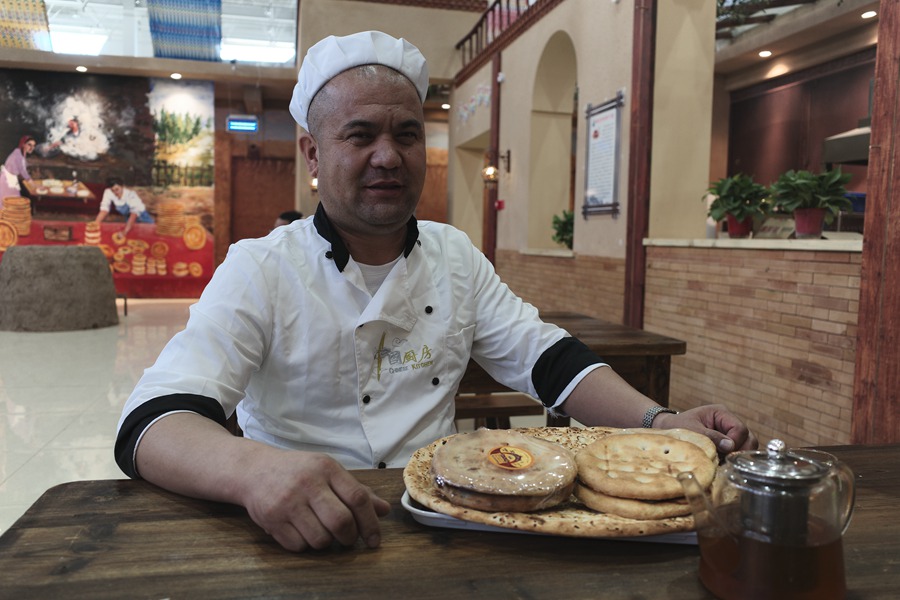Xinjiang: Life roars ahead like a blazing fire after eradicating poverty

The Flaming Mountains in Xinjiang are drenched in crimson light. It is the hottest place in China, frequently reaching 50 °C or higher.
Rising from the rim of Taklamakan, China’s largest desert, the Flaming Mountains in Xinjiang are drenched in crimson light. It is the hottest place in China, frequently reaching 50 °C or higher. Over thousands of years, countless merchants and travelers have lost their lives in the mountains’ red sandstone trenches and gullies, but the locals still cling tenaciously to life on this scarlet, barren land.
Unsurprisingly, in this land covered by bleak mountains and flaming deserts, poverty was a nightmare that haunted locals for centuries. In his masterpiece The Travels of Marco Polo, Venetian explorer Marco Polo (1254-1324) described the harsh living conditions and poverty of Xinjiang: “[The desert] consists entirely of mountains and sands and valleys. There is nothing at all to eat.”
It is hard for people to imagine that abject poverty, a chronic malaise that had plagued Xinjiang for hundreds of years, was eradicated in 2020, when over 3 million citizens and 3,666 villages were lifted out of poverty. The carmine barren land, once a symbol of struggle and unbearable poverty, has now come to represent prosperity. Today, China’s largest thermometer is on display next to the Flaming Mountains, attracting countless visitors who come to enjoy the beauty of the sprawling vineyards and the desolation of the wuthering wilderness.
“The fire of poverty once burned away our hope for a better life, but now our life is booming like a blazing flame. Xinjiang is not a poverty-stricken region anymore, and I have confidence in our future,” said 26-year-old Umitjan Memet, who has been living in a small town near the Flaming Mountains and now works as a manager at a boutique hotel in Turpan.
Exchanging poverty for prosperity
AllaBerdi Semet’s family has been making nang for three generations. Despite working day and night to make the delicious bread, the family used to be so poor that they didn’t even have enough money to repair their crumbling ancestral house.
AllaBerdi Semet’s cramped bakery is definitely not a sight for sore eyes, but this is not something customers usually think about when they catch the fragrance of his delicious nang, an Uyghur-style flatbread. 38-year-old Semet has been making this local specialty for over 22 years, and is a nang master at Kashgar Nang Culture Park, where his bakery has 18 apprentices and 10 electronic ovens.
“My family has been making nang for three generations. I grew up watching my mom making nang in our clay oven. It is the only thing I am good at,” said Semet.
Semet grew up in Yengisar County of Kashgar Prefecture, one of the poorest regions in Xinjiang. Despite working day and night to make delicious nang, Semet’s family were so poor that they didn’t even have enough money to repair their crumbling ancestral house.
“Without enough money, I had to drop out of school and became an apprentice at a nang bakery in Kashgar in 1999. With years of hard work and study, I became a nang bread master and opened my own shop in 2012,” said Semet.
Although making nang helped Semet get rid of poverty, his monthly income remained at 5,000 yuan from 2012 to 2019. The lack of brand publicity and innovation left his business in the doldrums, and prosperity remained a distant dream.
The situation began to change in 2020 with the establishment of the Kashgar Nang Culture Park, where a full-scale food and cultural tourism industry featuring nang took shape. Renting a small bakery in the nang park, Semet carried out experiments to improve the flavor of his nang, creating flatbread with rose, walnuts or bacon fillings. Innovation helped him establish his own brand “Ma-de Nang” and his products are now sold to mega cities like Shanghai via internet.

Semet now has his own nang brand “Ma-de” and has created nang with a range of new flavors. (People’s Daily Online/ Kou Jie)
Like Semet, over 2,000 local residents have found jobs in the park, most of whom are from impoverished families. The park attracts countless visitors from across China, and sells as many as 300,000 nang every day. According to statistics, Xinjiang now produces an average of 650 metric tons of nang a day, which is sold to 21 provinces and regions around China. More and more nang industrial parks have been set up around Xinjiang to meet the demand from lovers of nang all over the country.
“Nang is the secret of my prosperous life. Now I can earn 15,000 yuan every month. I’ve bought a spacious new home in Kashgar, where I live with my parents, wife and son. My life is so happy now,” said Semet.
50-year-old Memetjan is a frequent buyer of Semet’s nang bread. Memetjan’s home is 2.4 kilometers north of the nang cultural park, in a luxuriant hamlet compactly nestled among paddy fields and springs. Yuqarqi Qaqulla village, which is now a local ecological tourism site, is carpeted with peach blossoms, with fast-flowing brooks and scattered guest houses adding strokes and splashes to the natural canvas. When visiting this idyllic dreamland, tourists could hardly imagine that this charming village was a severely polluted and poverty-stricken land just five years ago.
“Just a few years ago, the brooks and springs in our village were filled with garbage, while our paddy fields oozed filthy water. Our only income was from the rice we grew, and we were very poor at that time,” said Memetjan.
Memetjan’s wife, 40-year-old Amangul, still remembered their life of poverty. “We didn’t even have gas stoves or drainage in our kitchen. If I wanted to cook for the kids, I had to go out and fetch some wood to start a fire. Life was really hard at that time,” said Amangul.

After getting rid of poverty, Memetjan’s family now enjoys a happy life. (People’s Daily Online/ Kou Jie)
The couple’s life began to change in 2016, when the local authorities decided to make good use of the village’s natural springs and paddy fields, and shift its development focus to ecological tourism. Memetjan renovated his small grocery store to attract more tourists, while Amangul became a waitress at the village’s tourist centre.
“With the help of local authorities, we have even renovated our old house. My kitchen is so bright and filled with electrical appliances, I feel so content with my life now,” said Amangul happily.
The couple are not the only ones who have benefited from local tourism. The village has provided jobs to 186 people, 45 of whom are from poor families like Memetjan and Amangul. From June 2019 to December 2020, their village received over 100,000 visitors from across China, garnering a total income of 2.8 million yuan.

Though still young, Memetjan’s three children have already made plans for their future. (People’s Daily Online/ Kou Jie)
Playing video games in his bedroom, 13-year-old Abduhelil, Memetjan and Amangul’s second child, dreams of visiting New York City one day. “I have watched so many movies of Spider-Man. I would like to see the city where he fights the bad guys,” said Abduhelil.
Sitting in their spacious yard, 17-year-old Munire and her 8-year-old little brother Abdurusul talked about their future plans. Soon to become a university student, Munire said she wanted to study in a city like Wuhan where the weather is warm in winter, and said it was her dream to become a lawyer. Little Abdurusul said he wanted to become a policeman so that he could protect his family and other good people.
“Because of poverty, we didn’t have the chance to go to college or to see the outside world. Now life is getting better, I hope my three kids can go to university and chase their dreams, whatever they are,” said Memetjan.
New path to a wealthy life

Live-streaming and e-commerce helped Muqeddes Weli become an online celebrity and get rid of poverty. (People’s Daily Online/ Kou Jie)
Live-streaming from a vineyard in Turpan, 24-year-old Muqeddes Weli was busy introducing delicious grapes to her audience. After selling local agricultural products for almost two years, she has now become an online celebrity with over 920,000 followers.
“Before becoming a social media influencer, I used to help my mom grow grapes in our four-acre vineyard. Without modern technologies or Internet, the quality of our grapes was not good, and no one would come to our remote village for our grapes. We could only earn 20,000 yuan per year,” said Muqeddes.
In 2019, when she heard that a local e-commerce team selling agricultural products was hiring social media influencers, Muqeddes, along with her girlfriends, decided to sign up for this new opportunity.
“I didn’t know anything about the Internet or e-commerce at that time. To become a good social media influencer, you must be talkative, have a lot of knowledge of Uyghur culture, and be fluent in Mandarin, all of which were challenges for me then,” said Muqeddes.
After a few months of training, Muqeddes became the top salesperson in her team. Her live-stream can draw audiences of up to 5,000 viewers, and her genuine smile and knowledge of local culture have garnered her a huge fanbase.
“The Internet has helped me get rid of poverty. I can now earn over 10,000 yuan per month. We rented out our vineyard, and my mom doesn’t have to work so hard anymore. I can help her with my salary, and I feel really proud about it,” said Muqeddes.
Like Muqeddes, many poor families in Xinjiang have changed their lives with the help of modern technologies such as the Internet and e-commerce. In 2020, over 12.1 billion yuan in agricultural products, such as grapes and walnuts, were sold online in Xinjiang. Live-streamers like Muqeddes have contributed 1.2 billion yuan, holding over 16,393 live-stream shows, and drawing over 175 million viewers.

The Uyghur-style hotel where Umitjan Memet works is now a calling card of Turpan. (People’s Daily Online/ Kou Jie)
In addition to e-commerce, cultural tourism has also become a new means of poverty alleviation. The boutique hotel where Umitjan Memet works is now a calling card of Turpan, with its Uyghur-style decorations and furniture, as well as its cozy and modern architectural design attracting visitors across China.
An Jinqiang, party secretary of the Turpan tourism bureau, noted that Turpan’s cultural tourism industry has provided jobs for over 80,000 locals, many of whom are from impoverished families.
“Most of our clients are tourists who want to see authentic Uyghur culture and to taste Turpan’s specialty – grapes. With more and more visitors coming to Turpan, our grapes now sell quite well. Many locals have also transformed their ancestral houses into hotels, increasing their incomes,” said Umitjan.
Photos
Related Stories
- Kazakh girl in Xinjiang realizes dream of joining navy
- Xi signs order to confer honorary title on Xinjiang anti-terrorist squadron
- Cultural chronicle of Xinjiang: preserving tradition, embracing innovation
- Xinjiang's Alataw Pass reports growing China-Europe freight train trips in H1
- Chinese Embassy expresses firm opposition against French publication over report distorting Xinjiang issue: source
Copyright © 2021 People's Daily Online. All Rights Reserved.










